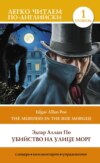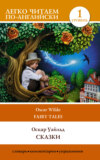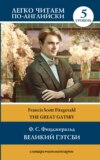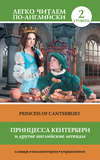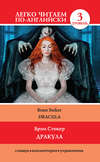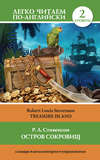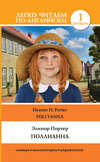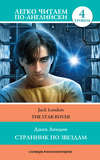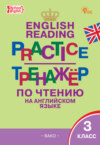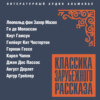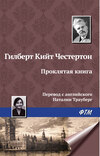Читать книгу: «Сельский вампир и другие истории Отца Брауна / Vampire of the Village and other Father Brown Stories. Уровень 3», страница 3
The Invisible Man
In the cool blue twilight of two steep streets in Camden Town, the shop at the corner, a confectioner’s, glowed like the butt of a cigar. One should rather say, perhaps, like the butt of a firework. The light was of many colours and some complexity, broken up by many mirrors and dancing on many gilt and brightly-coloured cakes and candies. Against this one fiery glass were glued the noses of many homeless kids, because the chocolates were all wrapped in those red and gold and green metallic colours which are almost better than chocolate itself; and the huge white wedding-cake in the window was somehow at once remote and satisfying, just as if the whole North Pole were good to eat85. Such rainbow provocations often attract the youth of the neighbourhood up to the ages of ten or twelve. But this corner was also attractive to youth at a later stage; and a young man, not less than twenty-four, was staring into the same shop window. To him, also, the shop was of fiery charm, but this attraction was not wholly to be explained by chocolates; which, however, he liked.
He was a tall, burly, red-haired young man, with a resolute face but a listless manner86. He carried under his arm a flat, grey portfolio of black-and-white sketches, which he had sold with more or less success to publishers ever since his uncle (who was an admiral) had disinherited him for Socialism87, because of a lecture which he had delivered against that economic theory. His name was John Turnbull Angus.
Entering at last, he walked through the confectioner’s shop to the back room, which was a sort of pastry-cook restaurant, merely raising his hat to the young lady who was serving there. She was a dark, elegant, alert girl in black, with a high colour88 and very quick, dark eyes; and after the ordinary interval she followed him into the inner room to take his order.
His order was evidently a usual one. ‘I want, please,’ he said with precision, ‘one halfpenny bun and a small cup of black coffee.’ An instant before the girl could turn away he added, ‘Also, I want you to marry me.’
The young lady of the shop stiffened suddenly and said, ‘Those are jokes I don’t allow.’
The red-haired young man lifted grey eyes of an unexpected seriousness.
‘Really and truly,’ he said, ‘it’s as serious – as serious as the halfpenny bun. It is expensive, like the bun; one pays for it. It is indigestible, like the bun.89 It hurts.’
The dark young lady had looked at him for a long time, studying him with almost tragic attention. At the end of her scrutiny she had something like the shadow of a smile, and she sat down in a chair.
‘Don’t you think,’ observed Angus, absently, ‘that it’s rather cruel to eat these halfpenny buns? They might grow up into penny buns90. I shall give up these brutal sports when we are married91.’
The dark young lady rose from her chair and walked to the window, evidently in a state of strong but not unsympathetic cogitation92. When at last she swung round again with an air of resolution93 she was surprised to see that the young man was carefully laying out on the table various objects from the shop-window. They included a pyramid of highly coloured sweets, several plates of sandwiches, and the two decanters containing that mysterious port and sherry which you meet only in pastry-cooks. In the middle of this neat construction he had carefully let down the enormous load of white sugared cake which had been the huge ornament of the window.
‘What on earth are you doing94?’ she asked.
‘Duty, my dear Laura,’ he began.
‘Oh, for the Lord’s sake, stop a minute,’ she cried, ‘and don’t talk to me in that way. I mean, what is all that?’
‘A ceremonial meal, Miss Hope.’
‘And what is that?’ she asked impatiently, pointing to the mountain of sugar.
‘The wedding-cake, Mrs Angus,’ he said.
The girl marched to the cake, removed it with some clatter, and put it back in the shop window; she then returned, and, putting her elegant elbows on the table, regarded the young man not unfavourably but with considerable exasperation95.
‘You don’t give me any time to think,’ she said.
‘I’m not such a fool,’ he answered; ‘that’s my Christian humility.’
She was still looking at him; but she had grown considerably graver behind the smile.
‘Mr Angus,’ she said steadily, ‘before there is a minute more of this nonsense I must tell you something about myself as shortly as I can.’
‘Delighted,’ replied Angus gravely. ‘You might tell me something about myself, too, while you are about it.’
‘Oh, do hold your tongue and listen,’ she said. ‘It’s nothing that I’m ashamed of, and it isn’t even anything that I’m specially sorry about. But what would you say if there were something that is no business of mine and yet is my nightmare96?’
‘In that case,’ said the man seriously, ‘I should suggest that you bring back the cake.’
‘Well, you must listen to the story first,’ said Laura, persistently. ‘To begin with, I must tell you that my father owned the inn called the “Red Fish” at Ludbury, and I used to serve people in the bar.’
‘I have often wondered,’ he said, ‘why there was a kind of a Christian air about this one confectioner’s shop97.’
‘Ludbury is a sleepy, grassy little hole in the Eastern Counties, and the only kind of people who ever came to the “Red Fish” were occasional commercial travellers, and for the rest, the most awful people you can see, only you’ve never seen them98. I mean little, idle men, who had just enough to live on and had nothing to do but lean about in bar-rooms and bet on horses, in bad clothes that were just too good for them. Even these wretched young rotters99 were not very common at our house; but there were two of them that were a lot too common – common in every sort of way. They both lived on money of their own, and were wearisomely idle and over-dressed. But yet I was a bit sorry for them, because I half believe they visited our little empty bar because each of them had a slight deformity; the sort of thing that some yokels laugh at100. It wasn’t exactly a deformity either; it was more an oddity. One of them was a surprisingly small man, something like a dwarf, or at least like a jockey101. He was not at all jockeyish to look at, though; he had a round black head and a well-trimmed black beard, bright eyes like a bird’s; he jingled money in his pockets; he jangled a great gold watch chain; and he was always dressed just too much like a gentleman to be one. He was no fool though, though a futile idler; he was curiously clever at all kinds of things that couldn’t be the slightest use; a sort of impromptu conjuring102; making fifteen matches set fire to each other like a regular firework; or cutting a banana or some such thing into a dancing doll. His name was Isidore Smythe; and I can remember him still, with his little dark face, just coming up to the counter, making a jumping kangaroo out of five cigars.
‘The other fellow was more silent and more ordinary; but somehow he alarmed me much more than poor little Smythe. He was very tall and thin, and light-haired; his nose had a high bridge, and he might almost have been handsome in a spectral sort of way103; but he had one of the most appalling squints104 I have ever seen or heard of. When he looked straight at you, you didn’t know where you were yourself, let alone what he was looking at105. I think this sort of defect embittered the poor chap a little; because while Smythe was ready to show off his monkey tricks anywhere, James Welkin (that was the squinting man’s name) never did anything except waste time in our bar, and go for great walks by himself in the flat, grey country all round. All the same, I think Smythe, too, was a little sensitive about being so small, though he carried it off more smartly. And so it was that I was really puzzled, as well as startled, and very sorry, when they both offered to marry me in the same week.
‘Well, I did what I’ve since thought was perhaps a silly thing. But, after all, these freaks were my friends in a way; and I didn’t want them to think that I refused them for the real reason, which was that they were so impossibly ugly. So I invented that I never meant to marry anyone who hadn’t carved his way in the world106. I said it was a principle with me not to live on money that was just inherited like theirs. Two days after I had talked in this well-meaning sort of way107, the whole trouble began. The first thing I heard was that both of them had gone off to seek their fortunes108, as if they were in some silly fairy tale.
‘Well, I’ve never seen either of them from that day to this. But I’ve had two letters from the little man called Smythe, and really they were rather exciting.’
‘Ever heard of the other man?’ asked Angus.
‘No, he never wrote,’ said the girl, after an instant’s hesitation. ‘Smythe’s first letter was simply to say that he had started out walking with Welkin to London; but Welkin was such a good walker that the little man dropped out of it, and took a rest by the roadside. Some travelling show picked him up, and, partly because he was nearly a dwarf, and partly because he was really a clever little wretch109, he did quite well in the show business, and soon went to the Aquarium, to do some tricks that I forget. That was his first letter. His second was much more of a surprise, and I only got it last week.’
The man called Angus emptied his coffee-cup and looked at her with mild and patient eyes. Her own mouth took a slight twist of laughter as she resumed, ‘I suppose you’ve seen everywhere the advertisements of “Smythe’s Silent Service”? Or you must be the only person that hasn’t. Oh, I don’t know much about it, it’s some clockwork invention for doing all the housework by machinery. You know the sort of thing:“Press a Button – A Butler who Never Drinks.” “Turn a Handle – Ten Housemaids who Never Flirt.” You must have seen the advertisements. Well, whatever these machines are, they are making pots of money; and they are making it all for that little imp whom I knew down in Ludbury. I am glad the things are going well for the poor little chap; but the plain fact is, I’m afraid he will come any minute telling me he’s carved his way in the world – as he certainly has.’
‘And the other man?’ repeated Angus with a sort of stubborn calmness.
Laura Hope got to her feet suddenly. ‘My friend,’ she said, ‘I think you are a witch110. Yes, you are quite right. I have not seen a line of the other man’s writing; and I have no idea of what or where he is. But it is of him that I am frightened. It is he who follows me. It is he who has half driven me mad. Indeed, I think he has driven me mad; for I have felt his presence where he could not have been, and I have heard his voice when he could not have spoken.’
‘Well, my dear,’ said the young man, cheerfully, ‘if he were Satan himself, he is done for now you have told somebody111. One goes mad all alone, old girl. But when was it you imagined you felt and heard our squinting friend?’
‘I heard James Welkin laugh as plainly as I hear you speak,’ said the girl, steadily. ‘There was nobody there, for I stood just outside the shop at the corner, and could see down both streets at once. I had forgotten how he laughed, though his laugh was as odd as his squint. I had not thought of him for nearly a year. But it’s a solemn truth that a few seconds later the first letter came from his rival.’
‘Did you ever make the phantom speak or squeak, or anything?’ asked Angus, with some interest.
Laura suddenly shuddered, and then said, with an unshaken voice, ‘Yes. Just when I had finished reading the second letter from Isidore Smythe announcing his success. Just then, I heard Welkin say, “He won’t get you, though.” It was quite plain, as if he were in the room. It is awful, I think I must be mad.’
‘If you really were mad,’ said the young man, ‘you would think you must be sane. But certainly there seems to me to be something strange about this unseen gentleman. Two heads are better than one – I spare you allusions to any other organs112 and really, if you would allow me, as a sturdy, practical man, to bring back the wedding-cake out of the window – ’
When he spoke, there was a sort of steely shriek in the street outside, and a small motor, driven at devilish speed, shot up to the door of the shop and stuck there. In the same flash of time a small man in a shiny top hat stood stamping in the outer room.
Angus, who had hitherto maintained hilarious ease from motives of mental hygiene, revealed the strain of his soul by striding abruptly113 out of the inner room and confronting the new-comer. A glance at him was quite sufficient to confirm the savage guesswork of a man in love114. This very dapper but dwarfish figure115, with the spike of black beard carried insolently forward, the clever unrestful eyes, the neat but very nervous fingers, could be none other than the man just described to him:Isidore Smythe, who made dolls out of banana skins and match-boxes; Isidore Smythe, who made millions out of undrinking butlers and unflirting housemaids of metal. For a moment the two men, instinctively understanding each other’s air of possession116, looked at each other with that curious cold generosity which is the soul of rivalry.
Mr Smythe, however, made no allusion to the ultimate ground of their antagonism117, but said
simply and abruptly, ‘Has Miss Hope seen that thing on the window?’
‘On the window?’ repeated the staring Angus.
‘There’s no time to explain other things,’ said the small millionaire shortly. ‘There’s something strange going on here that needs to be investigated.’
He pointed his polished walking-stick at the window, recently depleted by the bridal preparations of Mr Angus118. And that gentleman was surprised to see along the front of the glass a long strip of paper pasted, which had certainly not been on the window when he looked through it some time before. Following the energetic Smythe outside into the street, he found that some yard and a half of stamp paper119 had been carefully glued along the glass outside, and on this was written in straggly characters, ‘If you marry Smythe, he will die.’
‘Laura,’ said Angus, putting his big red head into the shop, ‘you’re not mad.’
‘It’s the writing of that fellow Welkin,’ said Smythe grimly. ‘I haven’t seen him for years, but he’s always bothering me. Five times in the last fortnight someone left threatening letters from him at my flat, and I can’t even find out who leaves them, let alone if it is Welkin himself. The porter of the flats swears that no suspicious characters have been seen. And here he has pasted up a sort of poster on a public shop window, while the people in the shop – ‘
‘Quite so,’ said Angus modestly, ‘while the people in the shop were having tea. Well, sir, I can assure you I appreciate your common sense in dealing so directly with the matter120. We can talk about other things afterwards. The fellow cannot be very far off yet, for I swear there was no paper there when I went last to the window, ten or fifteen minutes ago. On the other hand, he’s too far off to be chased, as we don’t even know the direction. If you’ll take my advice, Mr Smythe, you’ll put this at once in the hands of some energetic detective, private rather than public. I know an extremely clever fellow, who has set up in business five minutes from here in your car. His name’s Flambeau, and though his youth was a bit stormy, he’s a strictly honest man now, and his brains are worth money. He lives in Lucknow
Mansions, Hampstead.’
‘That is odd,’ said the little man, raising his black eyebrows. ‘I live, myself, in Himylaya
Mansions, round the corner. Perhaps you might care to come with me; I can go to my rooms and sort out these queer Welkin documents, while you run round and get your friend the detective.’
‘You are too kind,’ said Angus politely. ‘Well, the sooner we act the better.’
Both men, with a queer kind of impromptu fairness121, took the same sort of formal farewell of the lady, and both jumped into the brisk little car. As Smythe took the handles and they turned the great corner of the street, Angus was amused to see a gigantesque poster of ‘Smythe’s Silent Service,’ with a picture of a huge headless iron doll, carrying a saucepan with the inscription, ‘A Cook Who is Never Cross122.’
‘I use them in my own flat,’ said the little black-bearded man, laughing, ‘partly for advertisements, and partly for real convenience. Honestly, and all above board123, those big clockwork dolls of mine do bring your coals or claret or a timetable quicker than any live servants I’ve ever known, if you know which knob to press. But I’ll never deny, between ourselves, that such servants have their disadvantages, too.’
‘Indeed?’ said Angus; ‘is there something they can’t do?’
‘Yes,’ replied Smythe calmly; ‘they can’t tell me who left those threatening letters at my flat.’
The man’s motor was small and swift like himself; in fact, like his domestic service, it was of his own invention. If he was an advertising quack, he was one who believed in his own wares124. The sense of something tiny and flying was stronger as they swept up long white curves of road in the dead but open daylight of evening. Soon the white curves came sharper and dizzier; they were upon ascending spirals, as they say in the modern religions. For, indeed, they were climbing a corner of London which is almost as precipitous as Edinburgh, if not quite so picturesque. Terrace rose above terrace, and the special tower of flats they sought, rose above them all to almost Egyptian height, gilt by the level sunset125. The change, as they turned the corner and entered the crescent known as Himylaya Mansions, was as abrupt as the opening of a window; for they found that pile of flats sitting above London as above a green sea of slate. Opposite to the mansions, on the other side of the gravel crescent, was a bushy enclosure more like a steep hedge or dyke than a garden, and some way below that ran a strip of artificial water, a sort of canal, like the moat of that surrounded fortress. As the car swept round the crescent it passed, at one corner, the stray stall of a man selling chestnuts; and right away at the other end of the curve, Angus could see a dim blue policeman walking slowly. These were the only human shapes in that high suburban solitude; but he had an irrational sense that they expressed the speechless poetry of London. He felt as if they were figures in a story.
The little car shot up to the right house like a bullet, and shot out its owner like a bomb shell. He was immediately inquiring of a tall commissionaire in shining braid, and a short porter in shirt sleeves126, whether anybody or anything had been seeking his apartments. He was assured that nobody and nothing had passed these officials since his last inquiries; after that he and the slightly surprised Angus were shot up in the lift like a rocket, till they reached the top floor.
‘Just come in for a minute,’ said the breathless Smythe. ‘I want to show you those Welkin letters. Then you might run round the corner and bring your friend.’ He pressed a button concealed in the wall, and the door opened of itself.
It opened on a long, commodious ante-room, of which the only main features, ordinarily speaking, were the rows of tall half-human mechanical figures that stood up on both sides like tailors’ dummies. Like tailors’ dummies they were headless; and like tailors’ dummies they had a handsome unnecessary humpiness127 in the shoulders, and a pigeon-breasted protuberance of chest128; but barring this, they were not much more like a human figure than any automatic machine at a station that is about the human height. They had two great hooks like arms, for carrying trays; and they were painted pea-green, or vermilion, or black for convenience of distinction129; in every other way they were only automatic machines and nobody would have looked twice at them. On this occasion, at least, nobody did. For between the two rows of these domestic dummies lay something more interesting than most of the mechanics of the world. It was a white, tattered scrap of paper scrawled with red ink; and the agile inventor had snatched it up almost as soon as the door flew open. He handed it to Angus without a word. The red ink on it actually was not dry, and the message ran, ‘If you have been to see her today, I shall kill you.’
There was a short silence, and then Isidore Smythe said quietly, ‘Would you like a little whiskey? I rather feel as if I should130.’
‘Thank you; I should like a little Flambeau,’ said Angus, gloomily. ‘This business seems to me to be getting rather grave. I’m going round at once to bring him.’
Бесплатный фрагмент закончился.
Начислим
+7
Покупайте книги и получайте бонусы в Литрес, Читай-городе и Буквоеде.
Участвовать в бонусной программе


